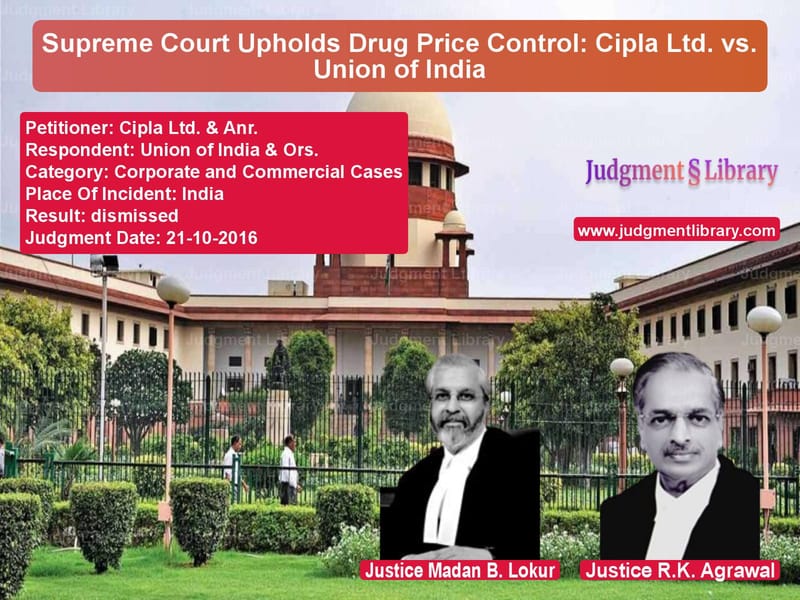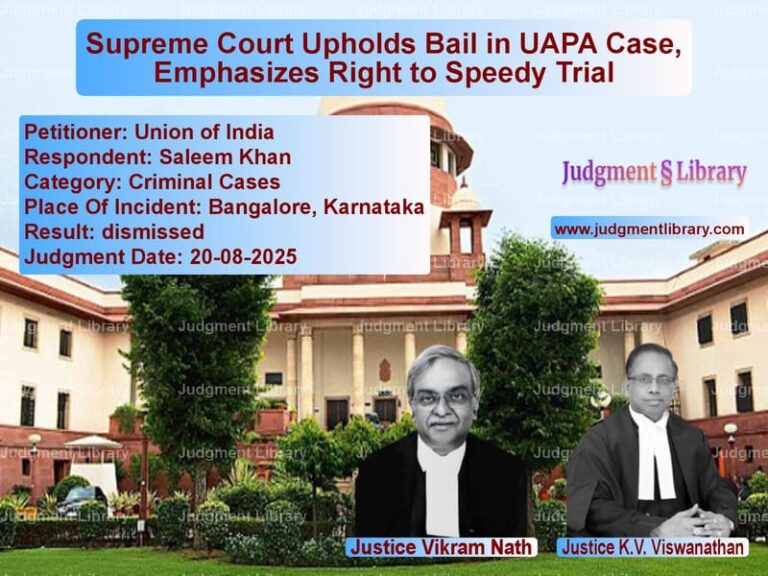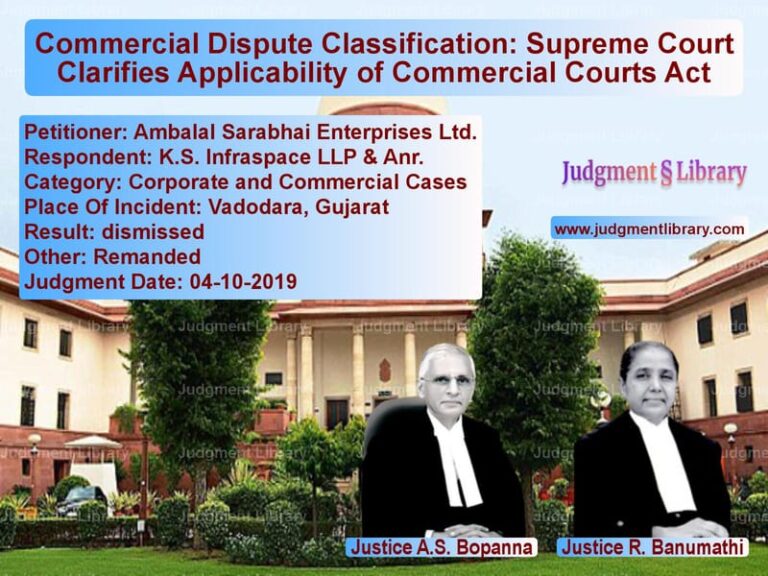Supreme Court Upholds Drug Price Control: Cipla Ltd. vs. Union of India
The Supreme Court of India delivered a landmark judgment in the case of Cipla Ltd. & Anr. vs. Union of India & Ors. concerning the implementation of drug price control regulations under the Drugs (Prices Control) Order, 1995 (DPCO, 1995). This case revolved around whether the Central Government had the legal authority to fix drug prices and whether such notifications were issued arbitrarily or followed due process. The ruling clarifies critical aspects of price control in the pharmaceutical sector, setting a precedent for future regulatory decisions.
Background of the Case
The dispute arose when the Central Government, under the DPCO, 1995, issued notifications setting norms for determining conversion costs, packaging charges, and process loss for drug manufacturers. The government periodically issued such notifications, starting from July 13, 1999, and continued revising them until 2003. Pharmaceutical companies, including Cipla Ltd. and Dr. Reddy’s Laboratories, challenged these notifications, arguing that the government had arbitrarily fixed the norms without reassessing the industry’s cost structures.
The Drugs (Prices Control) Order is a statutory framework enabling the government to regulate the prices of essential medicines to make them affordable for the public. The National Pharmaceutical Pricing Authority (NPPA) enforces this order, ensuring drug manufacturers comply with regulated pricing. Cipla and other pharmaceutical companies contended that the government’s price fixation was arbitrary and lacked a rational basis, thereby violating their constitutional and commercial rights.
Key Legal Issues Raised
- Whether the government’s notifications fixing conversion costs, packaging charges, and process loss were issued with due application of mind.
- Whether the government was required to reconsider pricing norms every year instead of mechanically issuing notifications based on past norms.
- Whether the government could fix the retail price of a formulation without first determining the bulk drug price.
- Whether the pharmaceutical companies’ rights under Article 19(1)(g) of the Indian Constitution, which guarantees freedom to practice any trade or profession, were violated.
Arguments by Cipla Ltd. (Appellant)
Cipla Ltd. and other pharmaceutical companies raised several contentions challenging the legality of the notifications:
1. Arbitrary Price Fixation
The appellants contended that the notifications were issued mechanically without reassessing actual costs. They argued that the government failed to consider fluctuations in manufacturing costs, including raw materials, labor, and inflation.
2. Failure to Conduct Fresh Determinations
Cipla argued that under the DPCO, 1995, the government was obligated to review the cost structure annually before issuing new notifications. However, instead of conducting fresh assessments, the government simply continued using previous data.
3. Non-Consideration of Cost Audit Reports
The pharmaceutical companies emphasized that the government had access to Cost Audit Reports (CARs), which provided real-time data on production costs. The failure to utilize CARs, they argued, made the pricing mechanism flawed and legally untenable.
4. Violation of Commercial Rights
By imposing artificially low price ceilings, the appellants claimed that the government’s actions curtailed their ability to conduct business profitably, infringing upon their rights under Article 19(1)(g) of the Constitution.
Arguments by the Central Government (Respondent)
The government defended its price fixation policy, arguing:
1. Regulations Serve Public Interest
The government maintained that drug price control was essential for ensuring affordable medicines for the public. It emphasized that the DPCO, 1995, was enacted to prevent exploitative pricing by pharmaceutical companies.
2. Adequate Consultation with Stakeholders
The government argued that before issuing notifications, it had consulted industry representatives, expert committees, and cost analysts. However, many pharmaceutical companies were uncooperative and failed to provide relevant cost data.
3. Use of Available Data
The government contended that it had relied on reliable cost estimates based on industry standards. It further stated that pharmaceutical companies had the option to challenge specific cost determinations before the NPPA but failed to do so.
4. Compliance with Regulatory Framework
The respondents asserted that the government had acted well within its authority under the Essential Commodities Act, 1955, and DPCO, 1995, to regulate drug prices in the interest of public health.
Supreme Court’s Judgment
After carefully examining the arguments, the Supreme Court ruled in favor of the Central Government and upheld the validity of the notifications.
1. Government’s Price Fixation Was Lawful
The Court held that the government had issued the notifications based on expert recommendations and industry-wide consultations. It ruled:
“The price fixation mechanism under the DPCO, 1995, serves a larger public interest, ensuring that essential medicines remain accessible.”
2. No Obligation to Conduct Fresh Determinations Annually
The Supreme Court rejected the argument that the government must conduct fresh cost assessments every year. It held:
“The requirement of annual review does not mean that the government must ignore previous cost assessments. It is sufficient if periodic adjustments are made based on reliable data.”
3. Use of CARs Not Mandatory
The Court found that while Cost Audit Reports (CARs) could be a useful tool, the government was not legally bound to rely on them exclusively for price fixation. It observed:
“The government is entitled to use alternative methodologies to ensure a balanced pricing framework.”
4. No Violation of Article 19(1)(g)
The Court dismissed the pharmaceutical companies’ claim that price control violated their commercial rights. It ruled:
“The right to conduct business under Article 19(1)(g) is subject to reasonable restrictions in the public interest. Price control of essential medicines falls within such reasonable restrictions.”
Conclusion
The Supreme Court’s decision in Cipla Ltd. vs. Union of India is a landmark ruling in pharmaceutical regulation. By upholding the validity of drug price control mechanisms, the Court reaffirmed the government’s role in ensuring that essential medicines remain affordable. This judgment provides a clear legal framework for drug price regulation and sets a precedent for future cases involving similar disputes.
Don’t miss out on the full details! Download the complete judgment in PDF format below and gain valuable insights instantly!
Download Judgment: Cipla Ltd. & Anr. vs Union of India & Ors Supreme Court of India Judgment Dated 21-10-2016.pdf
Direct Downlaod Judgment: Direct downlaod this Judgment
See all petitions in Company Law
See all petitions in Corporate Compliance
See all petitions in Bankruptcy and Insolvency
See all petitions in Judgment by Madan B. Lokur
See all petitions in Judgment by R K Agrawal
See all petitions in dismissed
See all petitions in supreme court of India judgments October 2016
See all petitions in 2016 judgments
See all posts in Corporate and Commercial Cases Category
See all allowed petitions in Corporate and Commercial Cases Category
See all Dismissed petitions in Corporate and Commercial Cases Category
See all partially allowed petitions in Corporate and Commercial Cases Category







